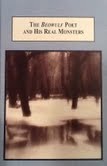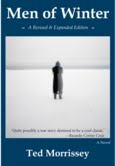For quite some time now, I've been interested in what I've come to call “the psychic origins of creativity.” That is, where do the guiding inspirations for a creative work come from? I’m mainly interested in writing, especially fiction, but I think the question pertains to any creative endeavor. In an earlier draft of this post I wrote the above question as “where does the guiding inspiration,” but I think making the question singular is rooted in the well-established romantic notion that a piece of writing grows from a single inspirational event, person or object—and that’s a gross oversimplification of the process. Many things, most of them mostly unconscious, contribute to shaping a novel, short story, poem, musical composition, work of art, and so on.
The creative act is both conscious and unconscious, but my belief is that far more of it is the latter—and certainly the most complex images and ideas stem from the writer’s unconscious mind. My monograph that came out last March, The Beowulf Poet and His Real Monsters (Mellen), provides a trauma-theory reading of the Anglo-Saxon poem. And the effects of trauma on the creative process, especially on the style and structure of the text, has been one of my primary interests. In addition to the Beowulf book, I've presented a series of conference papers on the manifestation of trauma in William H. Gass’s work, especially in his long, complex novel The Tunnel, but also, most recently, his novella “The Pedersen Kid” (“In the Heart of the Heart of the Cold War,” “William H. Gass’s ‘Very Cold Winter’,” “The True Intruder in William H. Gass’s ‘The Pedersen Kid’” ).
My study of the effects of trauma has led to my conclusion that the unconscious part of the mind is far more influential—or, at least, that it should be—in the creative process. I've found many writers who seem to agree. In the interest of brevity, I’ll quote only three:
Fellow Illinoisan Ray Bradbury: “My subconscious is more complicated than I ever imagined. I’ve learned over the years to let it run rampant and offer me its ideas as they come, giving them no preference and no special treatment. When the time is right, somehow they coalesce and erupt from my subconscious and spill onto the page” (from his introduction to the graphic novel version of Fahrenheit 451 by Tim Hamilton).
Fellow Irishman James Joyce: “A book, in my opinion, should not be planned out beforehand, but as one writes it will form itself, subject, as I say, to the constant emotional promptings of one’s personality” (in a letter to Arthur Power, reprinted in Gordon Bowker’s recent biography of Joyce).
Fellow Midwesterner William H. Gass: “You hope that the amount of meaning that you can pack into the book will always be more than you are capable of consciously understanding. You have to trick your medium into doing far better than you, as a conscious and clearheaded person, might manage” (as interviewed by Thomas LeClair for The New Republic).
In my own creative writing, I've had to learn to trust my unconscious mind to drive the narrative. That isn't to say I don’t make conscious decisions while writing and rewriting; of course I do. But, when I was a younger writer, I tried to plan and think out my characters and plots before actually writing about them. I’ve learned to let them take shape during the composition process itself. Two soon-to-be-released works, I believe, demonstrate the prominence of my unconscious mind in the creative process: a novelette, Figures in Blue, to be released in November digitally by Battered Suitcase Press and in print by Twelve Winters Press; and a novel, An Untimely Frost, to be released in January 2014 by Twelve Winters Press.
Ted Morrissey is the author of several works, including the monograph The Beowulf Poet and His Real Monsters (Mellen, 2013). He is the author of the novel Men of Winter and the forthcoming novelette Figures in Blue and novel An Untimely Frost. The Beowulf Poet and His Real Monsters (Mellen, 2013) received the press’s D. Simon Evans Prize for distinguished scholarship. His nonfiction, “Beowulf Waits for an Audience” appeared in issue 298.1 of North American Review.




